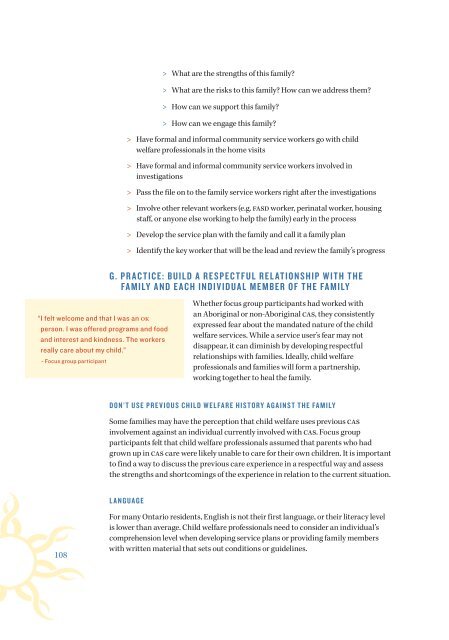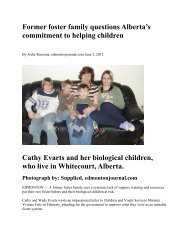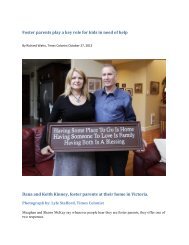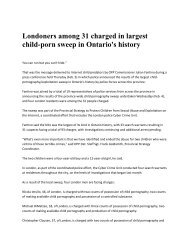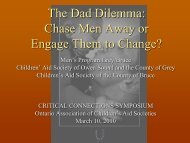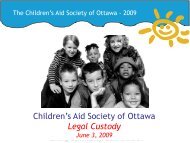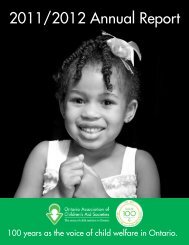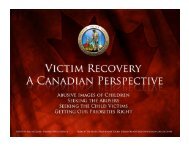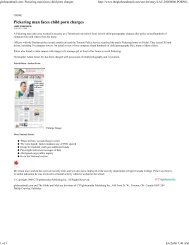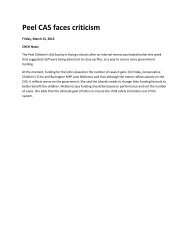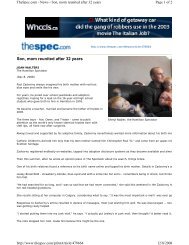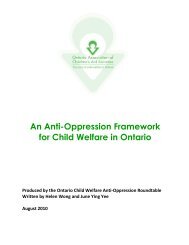English - Ontario Association of Children's Aid Societies
English - Ontario Association of Children's Aid Societies
English - Ontario Association of Children's Aid Societies
You also want an ePaper? Increase the reach of your titles
YUMPU automatically turns print PDFs into web optimized ePapers that Google loves.
What are the strengths <strong>of</strong> this family<br />
> What are the risks to this family How can we address them<br />
> How can we support this family<br />
> How can we engage this family<br />
> > Have formal and informal community service workers go with child<br />
welfare pr<strong>of</strong>essionals in the home visits<br />
> > Have formal and informal community service workers involved in<br />
investigations<br />
> > Pass the file on to the family service workers right after the investigations<br />
> > Involve other relevant workers (e.g. FASD worker, perinatal worker, housing<br />
staff, or anyone else working to help the family) early in the process<br />
> > Develop the service plan with the family and call it a family plan<br />
> > Identify the key worker that will be the lead and review the family’s progress<br />
“I felt welcome and that I was an OK<br />
person. I was <strong>of</strong>fered programs and food<br />
and interest and kindness. The workers<br />
really care about my child.”<br />
- Focus group participant<br />
G. PRACTICE: BUILD A RESPECTFUL RELATIONSHIP WITH THE<br />
FAMILY AND EACH INDIVIDUAL MEMBER OF THE FAMILY<br />
Whether focus group participants had worked with<br />
an Aboriginal or non-Aboriginal CAS, they consistently<br />
expressed fear about the mandated nature <strong>of</strong> the child<br />
welfare services. While a service user’s fear may not<br />
disappear, it can diminish by developing respectful<br />
relationships with families. Ideally, child welfare<br />
pr<strong>of</strong>essionals and families will form a partnership,<br />
working together to heal the family.<br />
DON’T USE PREVIOUS CHILD WELFARE HISTORY AGAINST THE FAMILY<br />
Some families may have the perception that child welfare uses previous CAS<br />
involvement against an individual currently involved with CAS. Focus group<br />
participants felt that child welfare pr<strong>of</strong>essionals assumed that parents who had<br />
grown up in CAS care were likely unable to care for their own children. It is important<br />
to find a way to discuss the previous care experience in a respectful way and assess<br />
the strengths and shortcomings <strong>of</strong> the experience in relation to the current situation.<br />
LANGUAGE<br />
108<br />
For many <strong>Ontario</strong> residents, <strong>English</strong> is not their first language, or their literacy level<br />
is lower than average. Child welfare pr<strong>of</strong>essionals need to consider an individual’s<br />
comprehension level when developing service plans or providing family members<br />
with written material that sets out conditions or guidelines.


